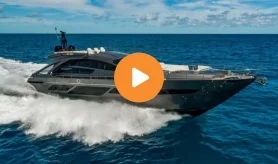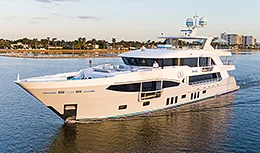- Alaskan Yachts
- Azimut Yachts
- Back Cove Yachts
- Beneteau Yachts
- Benetti Superyachts
- Bertram Yachts
- Boston Whaler
- Broward Yachts
- Buddy Davis Sportfish
- Burger Yachts
- Cabo Yachts
- Catamarans
- Carver Motoryachts
- Center Console
- Chris-Craft Yachts
- Cruisers Yachts
- DeFever Trawlers
- Dufour Sailboats
- Fairline Yachts
- Feadship Yachts
- Ferretti Yachts
- Formula Yachts
- Fountaine Pajot Cats
- Grady-White
- Grand Banks Trawlers
- Hargrave Yachts
- Hatteras Yachts
- Hinckley Picnic Boats
- Horizon Yachts
- Hydra-Sports
- Intrepid Boats
- Jarrett Bay Sportfish
- Jeanneau Yachts
- Kadey-Krogen Trawlers
- Lazzara Yachts
- Lekker Boats
- Luhrs Sportfish
- Marlow Yachts
- Maritimo Yachts
- Marquis Yachts
- McKinna Motoryachts
- Meridian Yachts
- Midnight Express
- MJM Yachts
- Mochi Craft
- Neptunus Motoryachts
- Nordhavn Trawlers
- Nordic Tugs
- Numarine Yachts
- Ocean Alexander Yachts
- Offshore Yachts
- Outer Reef
- Oyster Sailing Yachts
- Pacific Mariner Yachts
- Palmer Johnson Yachts
Bob Denison Explains Cryptocurrency with BoatTEST [In the News]
April 12, 2022 9:30 am
In 2014, Bob Denison, president of Denison Yachting, started facilitating yacht transactions with Bitcoin. His firm now handles other cryptocurrencies as well and has been involved in 10 transactions over the years. Find out how it all works in this video interview.
This video was featured on the BoatTEST.com YouTube channel in April 2022

We’re here at the 2022 Palm Beach Boat Show and we’re on a 117 footer called Crescent. And it’s being handled by Denison Yachting. And we’re here with Bob Denison and we’re going to ask him some questions about cryptocurrency.
Jeff: Bob, you were the first person to accept cryptocurrency in a brokerage transaction. When did you start doing that?
Bob: In 2014, which sounds like we were early to the game. I guess in yachting we were kind of early in the game of 2014 but by then Bitcoin was already taking off. That year we established a game plan to accept cryptocurrency for people that wanted to buy a yacht. The most important part of that was first of all to make it safe and really easy for the seller. So for the buyer to buy with cryptocurrency, if they have some Bitcoin or Ethereum, is easy. The hard part was to make sure that a seller would be comfortable accepting it and for us we were able to convert the cryptocurrency to US dollars for them in the event that they don’t want to hold the crypto. So that started back in 2014.
Jeff: Okay, cryptocurrency was started in 2009 and so 5 years later you decided to accept it. Why did you make that decision?
Bob: For us the same year in 2014, I jumped on a plane and went to Hong Kong to open up a multi-currency account. And the spirit behind that was the exact same spirit behind accepting cryptocurrency by going to Hong Kong, we set up this account to make it really easy for people with different currencies to buy a boat and to be able to keep that currency whether it’s a euro or a Chinese dollar or a yen or anything to keep it natively in their currency was much safer and easier for people. So that’s why we set that up. So the same year, I think it was a few months later, we started taking cryptocurrency because we wanted to go to where the client was, not necessarily say, “this is how things have to be, you need to put your deposit in US dollars in our escrow account exactly this way.” We hope to be the kind of company that embraces technology and also doesn’t say things like that.

Jeff: As you well know, in the beginning, Bitcoin had a sort of sketchy reputation. I’ve read that people thought that it was being used to launder dark or black money.
Bob: I would push up against that. I think that there are cases where of course that happens, there’s also cases where people use their laptop and their internet to do really shady things. It doesn’t necessarily make a laptop or the internet a bad thing or necessarily attached to technology that does the world wrong. I think that the vast majority of people using cryptocurrency, even in the very very early days, used it for the right reasons. There’s always going to be examples that aren’t that. But the vast majority then and the vast majority today are using cryptocurrencies for all the right reasons which would be transparency, speed of transaction, security… there’s a lot of reasons to use cryptocurrency and that’s why most people do it.
Jeff: To accept cryptocurrency, do you have to report it to your government?
Bob: For every one of our transactions we have a KYC protocol or KYC process. KYC is an acronym for “Know Your Customer”. We like to say “Know Your Client” but it’s the same thing where we, on the buy side, make sure that we know who the buyer is. We ask for proof of identity whether it’s a passport or a driver’s license: we really need to know where the money’s coming from. And the same thing with the seller. We need to know who the beneficial owners are, an LLC and there’s a lot of transparency. We’re not the only ones, most good yacht brokerage companies should be doing that and when it’s a crypto transaction, there’s actually even further KYC processes where you can do a scrub list to make sure that a wallet isn’t attached to bad things, there’s a blacklist. So the people that we partner with on the crypto transaction side of things is a company called Bitpay, they have their own KYC protocols that are even more stringent than ours. So we feel really really comfortable with it and we would report a crypto transaction just like we would report any other.

Jeff: I had an experience like this, not in crypto currency but in good old US dollars. This was many years ago, I wanted to buy British sovereign debt, it was paying about 15%. So I set it all up but they wouldn’t take the dollars and they said you have to prove where this came from and so I said okay here’s my banker, she knows exactly where it came from. So is this the kind of thing, these outfits do that you partner?
Bob: So KYC, a lot of it birthed from the US government, really making sure that it was very very very difficult for people to launder money or to fund illegal things like terrorism and to move money around in ways that we wouldn’t want bad people to be moving money around. So it’s really all rooted in that. KYC process could be different for a lot of different companies and people. But the guts of it, the most important part whether it’s a real estate transaction whether you’re buying sovereign debt or whether you’re buying a yacht is just to make sure that the company you’re dealing with knows exactly who you are and exactly where the money came from.
Jeff: You’ve been doing this since 2014, how many transactions have you had in Bitcoin?
Bob: We’ve had just about a dozen transactions. Most of them have been purchases for yachts. We’ve completed a few charters as. We’ve sold a few yachts, two in particular have been over 10 million dollars in value. There’s been some smaller ones: there’s been catamarans, larger yachts, and everything in between. And we’re seeing, as you would imagine, the demand and the conversations for this ticking up, and not necessarily because Bitcoin is going up in value. It is, but it’s more about people feeling more comfortable with cryptocurrency and it’s not seen as this weird shady thing anymore. There’s a lot of normal people using it and talking about it. So I think we’re going to see the next 5 years, that number double or triple.
Jeff: Okay you talked about Bitcoin going up in value but it also goes down in value. It’s not a few hundred dollars, it’s thousands of dollars. Let’s talk about broaching the subject with the client you have. You’re representing him, you’re trying to sell his boat, do you ask him if he’ll accept cryptocurrency?
Bob: Yes so, by coincidence and we didn’t set this up, we decided to do this interview on one of the bigger boats at our display. This yacht in particular is a 117 Crescent built in the Pacific Northwest, north of the border in Canada. The owner of this boat called Crescent Lady will actually accept crypto wallet to wallet. So it’s different from the crypto transactions we’ve done so far. Every one of the crypto transactions we’ve done so far, have gone through an exchange called Bitpay and they convert it based on the terms of the contract, they convert the cryptocurrency to US dollars or euros at the time of sale. Now more and more we’re having sellers like the owner of this boat saying, “I’ll just take it in my wallet, I don’t even need to convert it.” So we have 4 yachts right now in our sales fleet that are open to that and all of them are open to accepting cryptocurrency as long as we promise to make it safe and convert it to US dollars or euros for them.
Jeff: Okay, so if I wanted to sell my boat and accept cryptocurrency, would the price be set in, let’s say, US dollars or in cryptocurrency?
Bob: In US dollars. Saying that, we actually have a section on our website where we’ve pinged all of our listings to Bitcoin so for buyers that did want to see without having to do the math in their head exactly how many Bitcoin it would take to buy this yacht. They’d be able to do that instantly on our website.

Jeff: When you pin it, do you pin it in real time or is it once a day or what?
Bob: That’s a really good question. So Bitcoin changes every single second. I mean it’s constantly changing, constantly moving and that’s one of the challenges. The part of our process that makes it easy and safer is that the value of that Bitcoin is locked in for 15 minutes and the buyer has 15 minutes based on that pin of where the Bitcoin is to transfer the Bitcoin to Bitpay and if he misses that 15 minute window, then it’s reset.
Jeff: If I wanted to sell my boat for five million dollars and that equals, just to keep the math simple, five million Bitcoins: I have 15 minutes to make that transaction?
Bob: No, it’s the burdens on the buyer. Let’s say you’re selling your boat for five million dollars, I have a bunch of Bitcoin. Let’s say I have exactly five million dollars’ worth of Bitcoin in my wallet which is a digital wallet that holds my cryptocurrency. I would need to contact a broker that accepts crypto. We’re not the only ones, I think we’re still one of the only ones and that broker can assist you with the normal part of the transaction sea trial survey holding money in escrow, all that stuff. But the owner of the cryptocurrency, once the time comes to fund the deal, he has 15 minutes to send the cryptocurrency to Bitpay in that 15-minute window. If he misses it, it’s reset. If he gets it in there in that 15-minute window to Bitpay, then the obligation is on them to convert it to US dollars for the owner or the boat or the seller the boat which would be you.
Jeff: At the rate that it was in those 15 minutes?
Bob: Right, so the seller, you would be receiving exactly five million dollars and the cost of all this by the way is born by the buyer of 1%. So there’s a 1% transaction fee that’s directly with Bitpay it doesn’t have anything to do with us for the cost of holding and converting the crypto into US dollars.
Jeff: Now, you say you’re not the only broker that accepts crypto. So it’s a concept that’s spreading in the in the industry.
Bob: For sure, there’s a company in Europe. We actually really like them they’re really good people and considered friends. The name of the firm is Super Yachts Monaco, they just did a transaction and I think you’re going to be hearing more and more and more. I have seen a few firms around here that are kind of marketing themselves as accepting crypto which is fine. But I don’t think they’ve done any completed any transactions yet. So for some firms it’s a little bit of a marketing gimmick, for others it’s really we’re here to do some business type of a thing. But either way I think you’re going to see the number of people like us, guys in yellow pants selling boats with cryptocurrency. I really think that number is going to double or triple in the next few years.

Jeff: Okay, you accept Bitcoin which is the oldest one but what other cryptocurrencies do you work with?
Bob: We also accept Ethereum, Dogecoin which you might know as a meme coin, Bitcoin cash and there’s a number of others, I could just bore you to death with the number of coins that we accept. But that list is growing and growing. And it’s worth noting too, out of all the transactions we’ve completed, the only crypto that has been used to fund a deal has been Bitcoin.
Jeff: What is the advantage for a buyer to accept Bitcoin?
Bob: Well, for a buyer the advantage would be: let’s say I’m the guy that has the crypto. Let’s say I have five million dollars’ worth of crypto, I likely made an investment early on. So that could represent a significant amount of my assets. For me, as a guy let’s just pretend I have 5 million dollars’ worth of Bitcoin that I initially invested, let’s say a hundred thousand years ago, it turned into 5 million dollars, I’m going to be seeking for things to buy, not just yachts but also perhaps a home. There’s even examples of guys that are going out there buying cups of coffee with cryptocurrency. But if a significant amount of my assets are in crypto, I’m going to be trying to find easy and convenient ways to spend that cryptocurrency with people that’ll accept it.
Jeff: I see and so by accepting it I broaden the number of people who might be potential buyers for my boat.
Bob: Right, which goes back to our original why we did it. To go to the client and not necessarily say, “oh you have crypto, that’s fine. You need to convert that into US dollars before you talk to me.”
Jeff: Very good. Well listen Bob, thank you very much for explaining your experience with cryptocurrency and we wish you well with it.
Bob: Thank you, thank you.




![Bob Denison Explains Cryptocurrency with BoatTEST [In the News]](https://cdn.denisonyachtsales.com/wp-content/uploads/2022/04/Web-Image-Resize-Template-1400-x-900-SN-9.jpg)
![Bob Denison Explains Cryptocurrency with BoatTEST [In the News] Share on Facebook](https://cdn.DenisonYachtSales.com/images/share1.svg)
![Bob Denison Explains Cryptocurrency with BoatTEST [In the News] Share via Email](https://cdn.DenisonYachtSales.com/images/share2.svg)
![Bob Denison Explains Cryptocurrency with BoatTEST [In the News] Share on Twitter](https://cdn.DenisonYachtSales.com/images/share3.svg)


